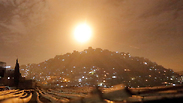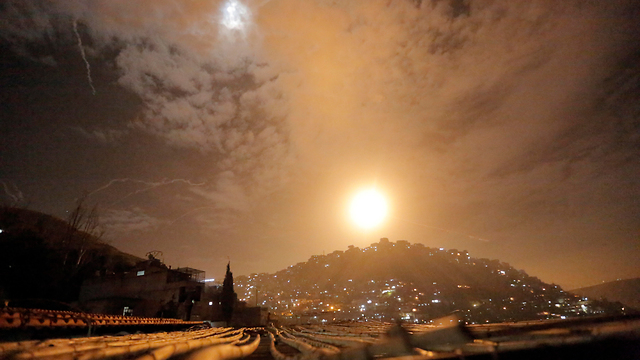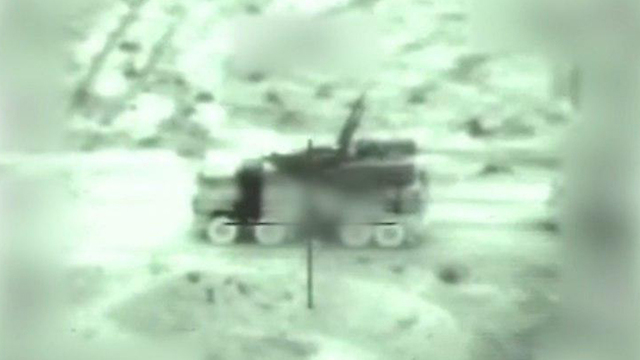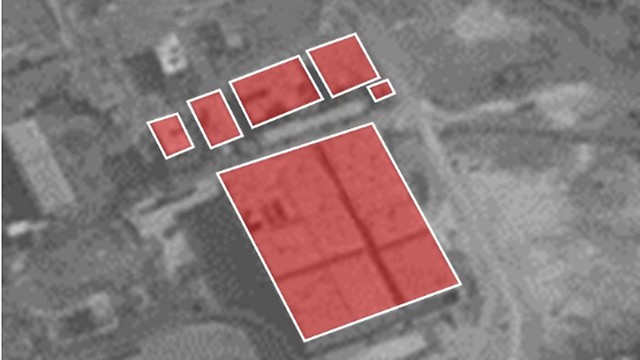
Israel and Iran escalate their 'war of messages' in Syria
Analysis: Tehran and Jerusalem are busy sending each other explosive signals of what they and will not tolerate, while Moscow's influence grows - but at what price?
The most significant event was Sunday's launch of an Iranian surface-to-surface missile at northern Israel, apparently by the Iranian Revolutionary Guards themselves and not by their Shiite militia allies. The launch of such a missile, although short-range, isn’t something that can be done on the spur of the moment. It requires preparation, like placing a launcher so that it won't be spotted by Israeli intelligence; it requires an order from above, apparently from Revolutionary Guards general Qassem Suleimani himself. The Iranians are well aware what such a move will mean from the perspective of Israel, who could not show restraint and would attack more Iranian targets, which is what happened.
Indeed, things have already happened that had never happened before. On May 10 of last year, the Revolutionary Guards fired dozens of surface-to-surface missiles at Israeli territory. Most of the rockets landed inside Syria, but four were intercepted by Iron Dome as they were about to enter Israeli territory. The IDF had been well-prepared for this incident, which came in retaliation for the killing of several members of the Revolutionary Guards and the destruction of hundreds of precision Iranian missiles inside Syrian territory. The IDF assessed that the Iranians would respond, and prepared for Operation Chess (or Operation House of Cards depending on whether you use the name given by the General Staff or the Air Force). The blow the Revolutionary Guards sustained at the time was designed to make an impact, for in response to the Iranian attack, the Israel Air Force struck and destroyed some 60 Iranian targets in Syrian territory.
This operation created an effective deterrent, and for a long while Iran refrained from direct confrontation with the Israelis. But there has been a recent shift. Iran has itself felt forced to respond to Israeli actions against it, perhaps because Suleiman was embarrassed when Israel ended the veil of ambiguity over its Syrian operations, and time and again more than hinted to the ayatollahs in Tehran, including Supreme Leader Ali Khamenei, that their general was failing in his efforts to entrench himself in Syria, despite the enormous sums they had invested in this endeavor.
Therefore, it seems, Suleimani himself prepared another launch of an Iranian surface-to-surface missile by members of his Quds Force, the elite external arm of the Revolutionary Guards. Perhaps he did it to ensure that the launch was carried out properly and perhaps to make clear to Israel that Iran was no less determined to continue its consolidation in Syria. It's reasonable to assume that the Iranians only prepared a single surface-to-surface missile to make clear that this was not a revenge attack, but rather as a signal to Israel. Otherwise, they likely would have launched a number of missiles. Perhaps under Russian pressure not to inflame the area, Suleiman sufficed with his one-missile signal, assuming that the Israeli response would be limited. And this is indeed what happened.
In contrast to what took place in mid-May, Israel on Monday morning only struck three or four Iranian targets, not dozens. Here too the message is clear: Israel is telling the Iranians that it wants to halt the entrenchment of the Quds Force in Syria, but is not interested in a war with Iran on Syrian soil.
Russia's growing involvement
A similar signal was sent Sunday afternoon, when according to foreign reports, Israel attacked Syria, apparently in order to prevent the landing of a plane owned by the Iranian airline Mahan at Damascus International Airport. It is fair to assume that the plane was transporting members of the Revolutionary Guards and Iranian munitions from Tehran. The attack attributed to Israel took place shortly before the plane was due to land in Damascus, and the Russians were given a short time in advance, offering Moscow the option of instructing the plane to turn back to its starting point in Tehran. In other words, Israel acted in line with the rules of coordination with Russia, and as such Moscow did not condemn the actions attributed to Israel either on Sunday afternoon or Monday morning.
But Iran decided to use the Sunday afternoon attack as a pretext for further action, and two hours after the plane returned to Tehran, the Iranians launched at Israel the surface-to-surface rocket that had been prepared in advance. Iron Dome batteries intercepted the rocket, and while it caused no damage and the skiing at the Hermon site continued as usual, Israel saw this as a severe provocation. As such, hours later it attacked Iranian logistical or intelligence targets in Syria.
And this time, too, Israel's conduct was unusual. Before the pre-dawn attack Monday morning, Jerusalem apparently warned the Syrian regime via Russia not to activate its anti-aircraft batteries during the strikes. The Syrian regime did not heed this uncharacteristic message, sending dozens of anti-aircraft missiles at Israel's planes and munitions, according to Syrian sources. Some of them hit several of the Israeli missiles launched at the Iranian targets.
The IDF Spokesperson's Unit said Monday morning that since the Syrians did not comply with the warning, the Israel Air Force attacked and destroyed several Syrian batteries and launchers. According to Syrian reports, a large number of anti-aircraft batteries of all types, especially the modern ones, were partially damaged or completely destroyed.
The photographs published by the IDF Spokesperson's Unit clearly show a Russian-made Panstir S1 anti-aircraft launcher, also known as SA-22. The S1 combines a missile launcher, an anti-aircraft cannon and radar all on one vehicle. Furthermore, the pictures show Syrian anti-aircraft missiles that were struck by the IAF, causing them to fly from their launchers and detonate nearby.
Russia said that four Syrian soldiers were killed in the IAF strikes near Damascus early Monday. The announcement said that the first Sunday afternoon attack attributed to the IAF was carried out by four planes firing from over the Mediterranean Sea.
Such announcements illustrate Russia's growing involvement in protecting Syrian skies and perhaps even the command of some Syrian antiaircraft. This is bad news, even though the Russians did not take a stand on Sunday and Monday and condemn Israeli actions (apparently because Israel acted according to the newly set rules), but it is clear that Russian involvement in Syrian airspace is increasing, which means that Israel's freedom is decreasing.
A delicate dance
The main question now is whether this is the end of the current round of fighting or not. Israel has a vested interest in continuing the campaign against Iranian entrenchment in Syria, but at the same time it also has a vested interest in returning to the ambiguity that for so long characterized the war between wars. It was this ambiguity that granted the Syrians and the Iranians the cover of plausible deniability, making it easier for them not to respond to attacks attributed to Israel.
It is also in Israeli interests not to provoke the Russians, thereby preserving the IAF's freedom of movement in the skies above Syria. It is apparent that Israel is now firmly focused solely on the center of Syria, something that it is fair to surmise is part of the understandings with the Russians. Indeed, Israel is now focused on Iranian targets near Damascus, making it clear to the Russians that it will not accept a breach of understandings on their part.
The Russians promised Israel that the Iranians would be kept to a distance of 80 kilometers from the Israeli border on the Golan Heights, eastwards and northwards in Syrian territory. But in practice, the Iranians are at Damascus International Airport and in the Al-Kiswah area, just 40 kilometers from the border. They have storage facilities for missiles and other weaponry there, as well as the intelligence installations that Israel just attacked, sending a signal not only to the Iranians but also to the Russians that must abide by their word.
In the past, the Russians claimed that the IAF had endangered their people in Syria, and that Israel should be focusing its activities in the area of Damascus airport, where there are no Russian military personnel, but there are multiple Iranian storage facilities, as well as to the north and south of Damascus. This is a delicate and brittle game in which Israel and the IDF try not to upset the applecart as they work to achieve their strategic goals of preventing an Iranian military base on the Syrian side of the shared border, and stopping Hezbollah from acquiring high quality weaponry, in particular precision rockets.
The challenge now facing new IDF Chief of Staff Aviv Kochavi is to successfully transform the IDF into an army that can win this "war between wars," which is being waged with semi-ambiguity as all parties involved are careful that the exchanges meant to send a signal do not devolve into actual fighting.













